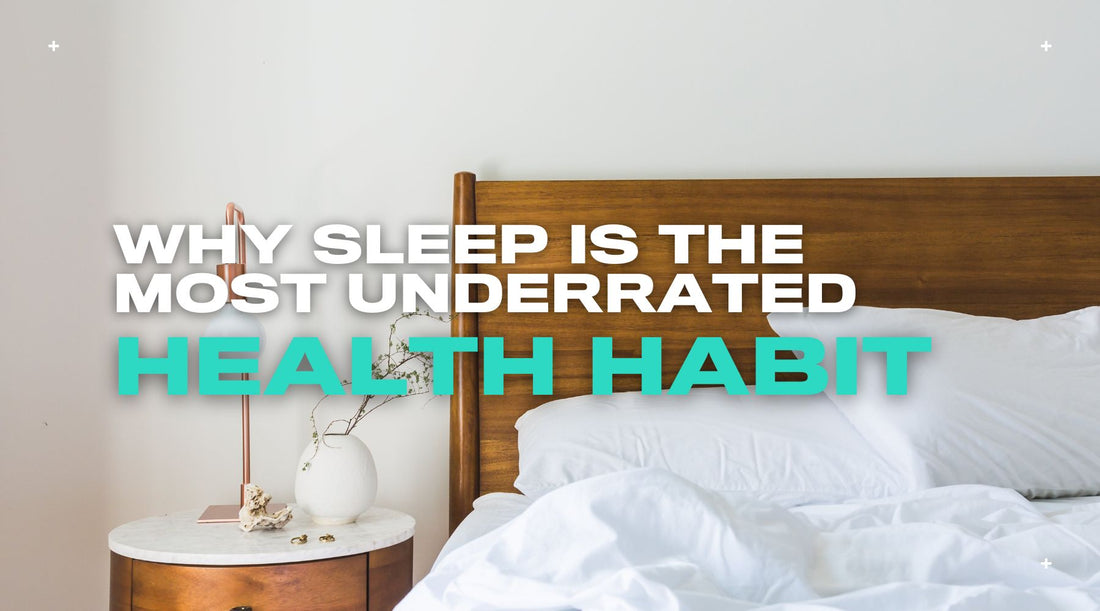
Why Sleep Is the Most Underrated Health Habit (And How to Do It Better)
If you want better energy, recovery, focus, or mood—start by sleeping better.
In a world obsessed with workouts, supplements, and smart tech, sleep is often the one health habit most people overlook. But when it comes to performance, recovery, metabolism, immunity and emotional regulation, sleep is the ultimate free health upgrade, and one of the most powerful levers you can pull to feel and function better.
In this article, we’ll explore the full spectrum of sleep benefits, why it matters more than most people realise, and how to improve it with practical strategies (including nutrition).
Why We Need Sleep: More Than Just Rest
Sleep isn’t passive downtime; it’s your body’s deep repair mode.
When you sleep well:
- Muscle tissue is rebuilt (essential post-training)
- Hormones are regulated (like cortisol, leptin and growth hormone)
- Memory consolidates and learning improves
- The immune system is primed
- Mood, focus, and decision-making improve
Sleep affects nearly every system in the body. Just one night of poor sleep can reduce insulin sensitivity, impair performance, and increase cravings for high-sugar foods.
In short: sleep isn’t optional if you want to feel and perform your best.

Top Science-Backed Benefits of Sleep
| Benefit | How Sleep Helps |
|---|---|
| Muscle recovery | Increases growth hormone, reduces inflammation |
| Cognitive function | Enhances memory, attention, problem-solving |
| Mood regulation | Supports serotonin and dopamine balance |
| Fat metabolism | Balances hunger hormones and glucose control |
| Immune strength | Increases pathogen resistance and healing response |
Poor sleep undermines even the best diet or training plan.
How to Sleep Better: Practical Wins for Better Rest
Stick to a Consistent Sleep-Wake Schedule
Your circadian rhythm thrives on regularity. Go to bed and wake up at the same time—yes, even on weekends.
Limit Blue Light and Tech Late at Night
Screens reduce melatonin, the hormone that helps you fall and stay asleep. Power down 1 hour before bed.
Dial Down Evening Stimulants
Caffeine, alcohol and sugar disrupt sleep quality. Avoid them 4–6 hours before bed.
Eat to Sleep - Yes, Really
A light, protein-rich snack before bed can improve recovery and support melatonin production.

The Role of Nutrition in Sleep Quality
A well-fed body sleeps better. Specifically, look for foods that:
Provide tryptophan (amino acid that helps make serotonin → melatonin)
Are low in sugar and seed oils (inflammation disrupts sleep)
Don’t cause GI distress or blood sugar crashes overnight
Examples:
-
- Roam bites (clean protein, no sugar, no dairy)
- Greek yoghurt with pumpkin seeds
- Turkey roll-ups with avocado
- Banana + almond butter
Roam for Better Rest and Recovery
Roam’s beef protein snacks are perfect for evening refuelling:
- Complete protein supports overnight muscle repair
- No added sugar = stable blood sugar during sleep
- Zero dairy, gluten, or additives = gentle on digestion
- Grass-fed beef = higher CLA, iron, and zinc for recovery
Try this: A Roam bite pouch + chamomile tea ~60 minutes before bed for calm, satisfied sleep support.
→ Shop Roam’s Recovery-Friendly Protein Snacks

Final Word: Sleep Is the Health Hack You Can’t Ignore
Want to feel sharper, lift stronger, manage stress better, and stay healthier? Sleep is the cornerstone.
And improving it doesn’t require apps or prescriptions—just consistent habits, nourishing food, and a little more intention.
Eat well. Rest hard. Roam freely.